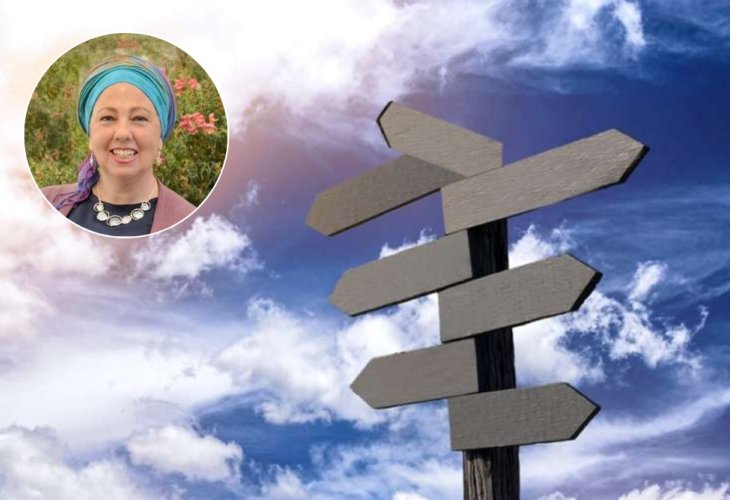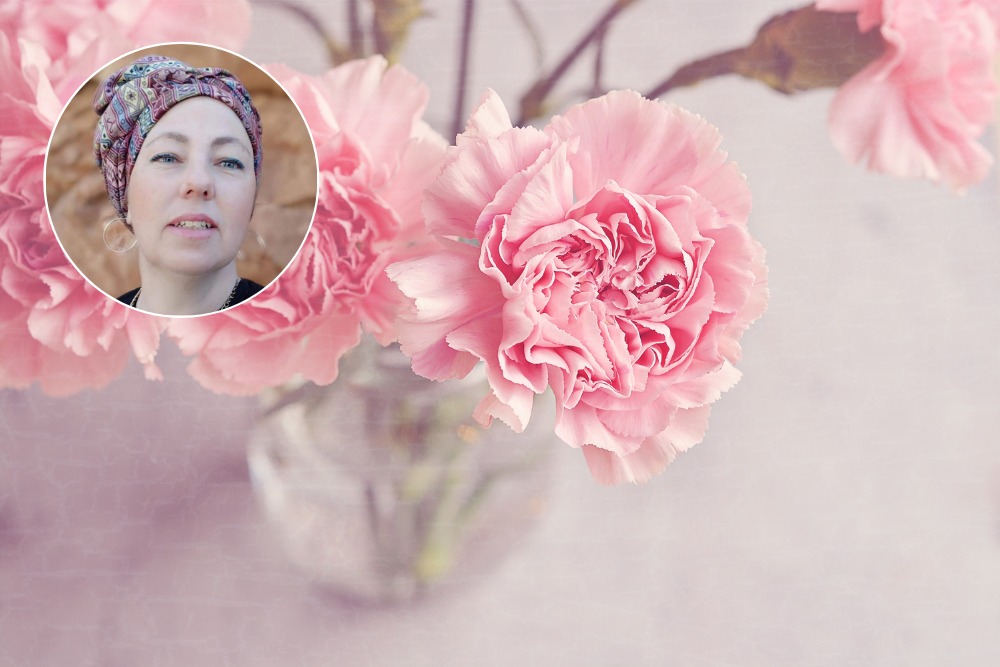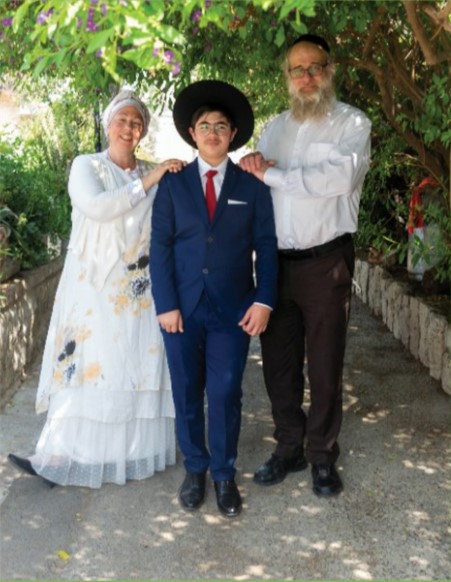"My Mom Said: 'I'm Okay with You Doing Anything in Life - Except Returning to Faith'"
Hadasa Ovad was born into a secular family. Searching for spirituality, she found emptiness even with Reiki and meditation. After returning to her faith and facing struggles in raising her children, she realized she's not alone. She now helps other women who have returned to faith to understand there are solutions and they are not alone.
 (In the circle: Hadasa Ovad, Photo: Ayelet Hen Friedman. Background image: shutterstock)
(In the circle: Hadasa Ovad, Photo: Ayelet Hen Friedman. Background image: shutterstock)Hadasa Ovad came from a warm and supportive family, but when she returned to faith, her mother, a liberal feminist artist, was shocked and did not understand where it came from.
As the daughter of well-known artists in Israel, she seemed destined for a professional and personal path of secular bourgeois life on the liberal side, but Hashem and Hadasa had different plans. Today, she leads a community of women who have returned to faith, guiding them on their life's journey personally.
"I grew up in Ra'anana in a very secular home, even though my mother came from a traditional family," she explains. "My grandmother came from a Chassidic family and immigrated to Israel before the Holocaust. Her father, my great-grandfather, was a great rabbi leading a community, advocating for Jews' rights, secular and religious, and was killed sanctifying Hashem's name in the Holocaust.
Despite Hadasa's maternal family being warm and good, her mother left the faith. "That's how we grew up: traditional grandparents, but secular parents. Art was central in our family's life, so naturally, I continued the way and enrolled in Bezalel Academy of Arts. I lived in the Nachlaot neighborhood, had many friends, loved the atmosphere, and the special charm of the holy city, feeling it was the home of my soul."
Awakening Encounter Leading 15 People Back to Faith
Did you have a connection with Hashem as a child or teenager?
"No. I didn't even know He existed for me. In fact, I didn't feel like anything was missing. I came from a family that gave me a lot of attention, and art occupied me. Seemingly, I lacked nothing."
It turns out something was missing because Hadasa began to show interest in spirituality. She encountered the New Age type of spirituality, known as 'spiritualism,' and various Reiki masters and meditation gurus came to her home in Jerusalem. "Just when I discovered this type of spirituality, I felt emptiness. I traveled to Sinai, where I had a spiritual experience that led me to feel Hashem and understand that I could reach out to Him."
Hadasa returned to Israel overwhelmed and turned to her friend from Bezalel, excitedly declaring she now knew there is Hashem and that everything she currently did was a sin. Her secular friend advised her to return to faith because they had a mutual friend who did and was happy. "What? Are you kidding? No way!" Hadasa replied, ending that discussion.
On Hadasa's winding journey in search of true spirituality, she met a group of people in Sinai and discovered the dark side of 'spiritualism.' "I saw egos running rampant. Everyone was in their bubble," but that didn't affect Hadasa; on the contrary. "In Sinai, someone asked me who I am. I introduced myself and said my name is Hadasa, and I'm returning to faith. It was there I decided to return to faith because the artificial spirituality didn't suit me."
At a social gathering at the Dead Sea, Hadasa had a strong experience as part of a group. There were significant divine providences, and 15 of the group members returned to their faith, something quite rare. "Additionally, I met a new friend there named Milat, who also returned to faith. She gave me her phone number, and since I was so far removed from religion, I called her on Shabbat. Her phone, of course, was off, but I kept calling the entire Shabbat, not realizing she was religious, and I was dialing on Shabbat. It turns out I had dialed the wrong number, and I only realized it after Shabbat."
Milat, Hadasa's new friend, was thrilled about making contact and invited her to her home. "I was enchanted, and since then we've met on Shabbat: we studied, recited the entire book of Psalms, and went to the synagogue. The experience was amazing. Through many conversations, reflections, and solitude, I grew closer to Hashem, but still didn't have full commitment to a lifestyle of Torah and mitzvot."
One day, Milat visited her and dreamed about her. The dream left a strong impression: a righteous person in a cave told Milat that Hadasa needed to decide, otherwise their connection couldn't continue. Hadasa understood the meaning of the dream: she needed to decide on returning to her faith. The next day she walked pale through the corridors of Bezalel, feeling she needed to buy a prayer book and one of Judaism's important ethical works - "Orchot Tzadikim." "I wanted to prove I was progressing. So, I, a Bezalel student, going to Geula neighborhood, the heart of ultra-Orthodox Jerusalem, wandered searching for the first bookstore I could find. I couldn't find any store and was too embarrassed to ask. I was about to give up and told Hashem that if I didn't find a store, I'd go home and that would be it. Suddenly, a bookstore appeared before me! I approached it with trembling, bought the books, and understood I was committed. From the initial searches to the final decision took a whole year. I informed my Rebbetzin, Rebbetzin Yael Paz, of blessed memory, with much respect and grandeur, 'That's it, I'm returning fully to my faith!' She looked at me and replied: 'Do you think it's that simple? There's a long road ahead.'"

Professors' Deliberate Ignorance
Hadasa waited to finish her studies at Bezalel to start studying at a seminary in Safed. Due to modesty reasons, she shelved her women's photographs from exhibitions at Bezalel and kept only pictures of the sky and water. Her last day at school was full of insults. "The professors there were anti-religion. They made faces at me and deliberately ignored me in a disgraceful way but I was with Hashem. I went outside and said to Him, 'Master of the Universe, all the disgrace I'm going through now, it's for you.' I laid out for Hashem a detailed list of my desired groom and asked Him to help me establish a kosher home."
The following day Hadasa was already at the seminary in Safed. She completed the book of Psalms every day, considered one of the diligent students, and something interesting happened. "During my unsuccessful matchmaking period, my roommate was introduced to a match suggested by my Rebbetzin. I listened to her reports on the meeting: a wise man with good qualities, but she wasn't interested in him. They matched but she decided to cancel everything, even though a wedding date had been set. She hoped she wasn't hurting him. During the conversation, my Rebbetzin called me and said she had to talk to me. I was sure she was going to introduce me to my roommate's match. The friend who was supposed to marry him also wanted to introduce me to him. Eventually, my husband and I got married on the same date set for their wedding. Thus, the friend's unsuccessful match turned into my dear husband."
Years later, after Hadasa was already married to her husband, he asked her if she had ever been in a bookstore in the Geula neighborhood as a single woman. Looking back, he realized he had encountered her there. "He said I appeared frightened, and he wanted to offer me a simpler prayer book for women, but due to my panic, he didn’t approach me."
Hadasa's husband, originally from Haifa, returned to faith after the army and sought work in high-tech. "When they got his resume, they invited him for interviews, but after seeing the kippah, he wasn't accepted and moved to Jerusalem." Thus, divine providence led the Ovad couple to meet and marry.
How did your parents react to your return to faith?
"My mom is a left-wing feminist artist distant from the religious experience, to the extent that a week before I officially returned to faith, she said: 'I'm okay with you doing anything in life - except returning to faith.' She was shocked and had difficulty accepting the news. Her father worked to bring the family together. After her grandchildren were born, my mom softened. "My mom is now proud of me, and the grandchildren fill her life," Hadasa shares excitedly.
As a rabbi’s wife, Hadasa taught at the seminary, served as a bridal instructor, their home was open for outreach, and she conducted workshops to advance single women in the area of relationships. "It was important for me to empower the women, give them a good feeling, and connect them to an internal and balanced place within their soul."
"I Rushed Quickly in My Faith and Then Stopped My Public Activities"
Meanwhile, children were born, and along came the effort involved in raising them. Hadasa’s husband, Rabbi Meir Ovad, was out of the home most days learning Torah and working for their livelihood, returning late. "I had dedication to Torah, and it was important to me that he worked. I raised the kids alone but received emotional support from him - if I needed him, he would come immediately. Everything was fine until an issue arose with one child struggling in his framework, showing signs that made me realize I was going fast in my faith, and the momentum was hitting a wall. In many households, there is thinking about returning to faith, but no thoughts on the continuation - what about the kids and suitable educational institutions? I wanted to stop the train and reflect on my life. So, I stopped all my activities." Alone in the struggle, Hadasa turned inward and began working with her children: patience, understanding the situation, and finding suitable educational frameworks.
Hadasa's experience led her to understand there are two phases in the lives of those who return to faith: the first phase happens when children are young - then there's strengthening in Torah, spirituality, and building the home. The second phase begins when children reach ages 12-13. They grow, start asking questions, and answers don't always satisfy them, especially against the abundance of temptations and pleasures of this world. Conflicts arise that can lead to discarding the yoke without understanding the deeper consequences of these actions. "In the first phase, everything is done to prevent 'it from happening to me.' What won't happen? That the child will stray from the path. The biggest fear of those returning to faith is that the children will leave religion," Hadasa explains.
Hadasa participated in a leadership seminar for women returning to faith, under the auspices of Rabbi Nitzani's "Netyot" organization. The organization's idea was an independent community of those returning to faith to continue working in their original professions while building a connected community framework contributing to the community they live in. At the seminar's end, each leader leaves with a life project, and Hadasa was revitalized. She realized what she was experiencing alone inside her home wasn't unique to her. She took the initiative - to bring women in Israel what she learned in the seminar.
 Photo: Yechiel Gurfein
Photo: Yechiel GurfeinNot to Be Alone
After the seminar, Hadasa aspired to initiate female dialogue on the challenges of those returning to faith. "Women are champions of spirituality. They fear Heaven, study Torah, and more, but there isn't always open discourse about challenges and the encounter with reality. Those returning to faith must make creative decisions with outside-the-box thinking," she explains, also illustrating: "What does a woman returning to faith who lives next to her secular in-laws do, who buy ice creams on Shabbat and distribute them to all the kids? Should she forbid her children from touching the ice creams in front of everyone and risk them possibly, God forbid, hating mitzvah observance, and offending her in-laws, or should she round corners and allow the kids to taste ice creams bought on Shabbat?
"I can understand the woman, embrace her, normalize the situation for her, and be there for her," Hadasa clarifies. "This is a good example of the issues women returning to faith face. Each was sure she alone was facing these things. Suddenly, when the discussion opened, the women realized it was part of life."
Hadasa speaks with great enthusiasm, and it's clear this mission is important to her. She also initiated a large women's conference with discussion circles on teenagers, livelihood, personal fulfillment, spirituality, and more. "I saw that women returning to faith of all types face the same challenges: dropout youth, livelihood, relationship issues, lack of self-fulfillment. It was terrible to experience, and a red light lit up for me. These amazing women gave their all and returned to faith - after 20 years will they break? I didn't want that." It's obvious from her voice that this still occupies her today.
"I continued with women’s meetings that included enjoyable outings, good food, and meeting friends. The connection was strong, truly invigorating. Women felt not alone because those returning to faith sometimes lack the full support of their extended family."
What to do when a child doesn't fit in yeshiva? What happens when transitioning from yeshiva to seminary? From Beit Yaakov to seminary? What to do when there are spiritual and ideological gaps between spouses? During these transitions, a crisis can begin. That's where Hadasa is for the women - in the crisis, helping them connect and believe in themselves.
"My help is in understanding it's a process. Not entering into blame and self-anger, stress, and anxieties. It must be understood there are souls here - children who are part of a divine process. When a girl weakens in modesty, one must embrace her, not blame her, and not fall into self-blame. It's like a child catching a cold. You tried to keep the child healthy as much as possible. There is no anger. I'm with the child. Is she a mother returning to a child not religious - will they forsake her? No."
And what is your vision for the future?
"Women are wise, and they understand things. My vision is that what they bring to the community - will break out. It's this clean place where a woman can be who she is, and her fear of Heaven is trusted. I want the support women's meetings provided to reach every home of women returning to faith."
And what message do you have for women?
"Not to be alone. Everything one experiences - it's part of a larger process, it's not just her. Women returning to faith need each other. Outsiders won't understand this. You can't do it alone."

